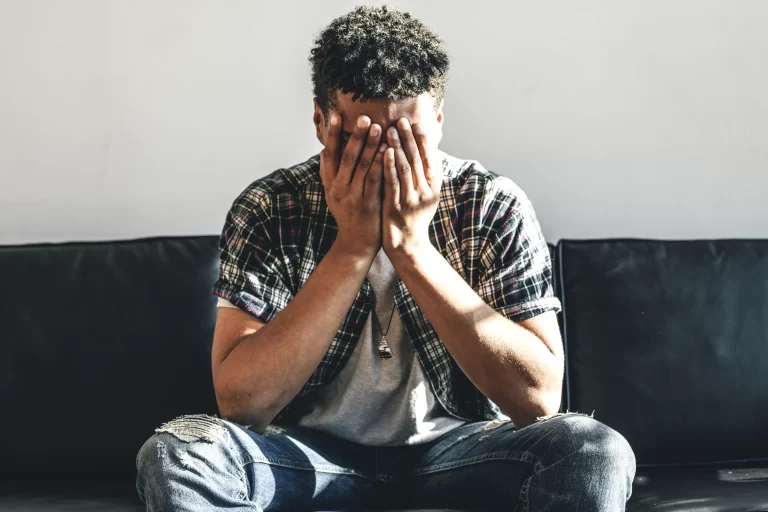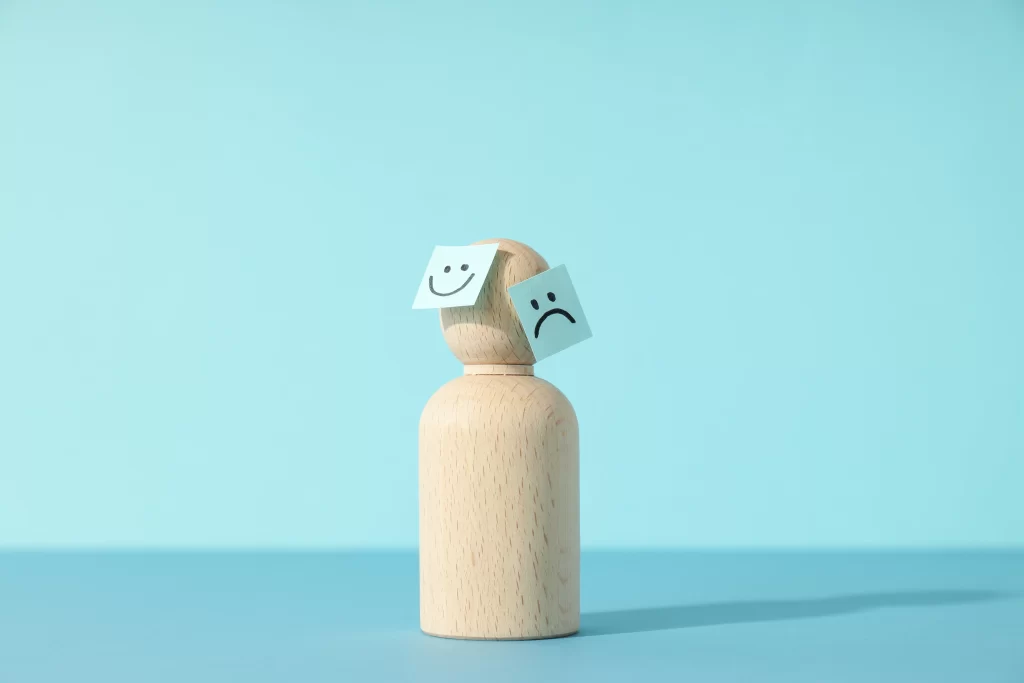What Is Bipolar?
Bipolar disorder describes significant mood swings that can go from:
- Emotional highs- feeling overly excited, happy and full of life
- Emotional lows (manic depression) – when you can feel very sad, depressed and languid
So, what is bipolar?
The name bipolar comes from the two mood extremes known as “mood poles”. These intense mood swings often come in episodes and may appear rarely or several times a year.
Symptoms of bipolar episodes depend on which mood you are currently experiencing. Some people may have emotional waving between the episodes, whilst others not. Bipolar episodes can last for several weeks or longer.
Bipolar disorder can affect behaviour, sleep and thinking patterns. Although it is a lifelong challenge, proper care and emotional support can significantly improve the quality of life of people with bipolar.
Medication and psychotherapy also show encouraging results in treating people with bipolar disorder.
Types of Bipolar Disorder
Bipolar disorder affects mood and how we act and react in daily social interactions and life activities. The signs and characteristics depend on the individual and the type of bipolar disorder. We will explain the common types of bipolar disorders and episodes that can emerge at any age in our life.
Bipolar I
Diagnosing bipolar disorder I typically occurs when a person experiences at least one manic episode lasting longer than a week. The same person may also have depressive episodes lasting from 6-12 months if not properly treated. A manic episode can last from 3-6 months without treatment.
Bipolar II
For this diagnosis, people may experience depressive symptoms linked to bipolar II disorder and at least one period of a major depressive episode. Bipolar II disorder manifests with hypomanic episodes rather than manic.
Cyclothymic Disorder
Cyclothymic disorder describes periods of depressive episodes and manic depression symptoms but with significantly reduced intensity than the symptoms of bipolar disorder I and bipolar disorder II.
People get diagnosed with cyclothymia if the episodes persist for at least two years in adults and one year in children or teenagers.
Bipolar With Mixed Features
Bipolar with mixed features is linked with a mix of symptoms of mania and depression simultaneously. This is also called the ‘mixed bipolar state’. For example, you might feel intensively sad and unmotivated but restless and overactive at the same time.
Bipolar With Seasonal Pattern
Bipolar disorder symptoms can be affected by the weather seasons throughout the year. For example, people with bipolar disorder may experience depressive episodes during winter days, while symptoms of mania can be more prominent in spring and summer.
This is associated with exposure to sunlight and is also called seasonality in people with bipolar disorder.
Rapid Cycling Bipolar
Rapid cycling bipolar refers to four or more manic, hypomanic and depressive episodes within a year. Women are more vulnerable to developing this type of emotional change than men, and it can appear and disappear at any time during a person’s life cycle.
Unspecified Bipolar Disorder
The term unspecified bipolar disorder describes emotional and mood changes within a person that do not share all the symptoms of manic or hypomanic episodes, or the symptoms do not last long enough to meet the criteria for a typical bipolar episode.

Signs and Symptoms of Bipolar Disorder
In bipolar disorder, the changing mood episodes can shift from mania and hypomania to depression. It is sometimes called manic depression, as people tend to go from overly happy and excited to episodes of significant languidness and hopelessness.
The signs and symptoms of bipolar disorder can vary from person to person, and they do not follow a specific pattern. For example, someone can experience depressive episodes several times in a row before switching to a manic episode.
The symptoms can also change over time, becoming more or less severe.
Bipolar Symptoms of Manic Episodes
Typical signs and symptoms of manic or hypomanic episodes include:
- Being overly happy, joyful, and excited
- Sudden mood swings from being cheerful to impulsive, easily agitated, unfriendly
- Lack of concentration
- Increased activity, energy and motivation
- Making important plans and having lots of ideas
- Euphoria – a state of excessive excitement and happiness
- Reduced need for sleep
- Making unpredictable and rushing decisions
- Susceptibility to drug or alcohol misuse
- Increased self-confidence and a state of well-being
- Lack of appetite
Bipolar Symptoms of Depressive Episode
Common signs and symptoms of depressive episodes in bipolar disorder include:
- Unexplained sadness and lack of energy
- Feeling hopeless and having low self-esteem
- Slow talk and difficulty focusing on one task
- Forgetfulness and difficulty making decisions
- Uncontrollable episodes of crying or irritability
- Inability to feel joy, pleasure or activity that you once liked
- Increased need for sleep or the opposite, insomnia
- Negative thoughts and negative anticipation for the future
- Frequent appetite changes
- Suicidal thoughts

Bipolar Symptoms in Men
Both males and females may develop bipolar disorder. Still, the main symptoms of the mood disorder, such as major depression or manic episodes, may vary depending on the gender you were assigned at birth.
Males can experience less frequent but more severe symptoms of manic or hypomanic episodes. Still, they can also experience symptoms of severe depression.
Men with bipolar disorder may:
- Get a bipolar disorder diagnosis earlier in life
- Become more susceptible to substance or alcohol misuse
- Experience less frequent but more intense manic symptoms
- Be more prone to impulsive reactions during manic episodes
Bipolar Symptoms in Women
Women with bipolar disorder are usually diagnosed between their 20s and 30s. In some cases, the first symptoms appear during pregnancy or after childbirth.
Women may be more susceptible to developing bipolar disorder due to frequent hormone changes related to menstruation, pregnancy or menopause. Also, women with bipolar disorder are more likely to experience major depressive disorder than men.
Women with bipolar disorder may experience the following:
- Depressive mood and more depressive episodes than manic or hypomanic
- Milder manic or hypomanic episodes
- More rapid cycling periods of mania and depression in 12 months
Bipolar Symptoms in Children
Diagnosing bipolar symptoms in children can be quite challenging as children do not have the same symptoms of bipolar disorder as adults.
Children have frequent mood swings and behaviours that can be difficult to identify and establish a precise diagnosis.
Sometimes, the signs of bipolar disorder in children may overlap with other anxiety disorders or attention deficit hyperactivity disorder (ADHD).
Bipolar disorders in children manifest with the following symptoms:
Manic phase in children:
- Feeling unusually happy or excited
- Fast and inconsistent speech, rapidly shifting subjects
- Lack of focus and concentration
- Doing potentially harmful or risky activities
- Easily irritated and short-tempered, with sudden outbursts of crying and agitation
- Lack of sleep or having trouble falling asleep
Depressive episodes in children:
- Sudden and unexpected crying or feeling very sad
- Sleep disorder, including lack or excessive sleep
- Lack of energy and interest in usual daily activities
- Frequent complaints of a stomach ache or a headache
- Unexplained feeling of guilt
- Changes in appetite, like eating too much or too little
- Feeling like their life doesn’t matter
Frequent mood swings are typical for children of any age. However, receiving a precise diagnosis and treatment on time is crucial if there is a suspected underlying condition.
Early intervention and proper treatment are of vital importance for managing the symptoms and improving the quality of life of children and adults with bipolar disorder.

What Causes Bipolar Disorder?
Medical experts still don’t know the exact cause and trigger of bipolar disorder diagnosis. Genetics and socio-environmental factors may play a part.
For example, if some of your family members are diagnosed with bipolar disorder, there is a chance you may develop it. However, scientists haven’t yet identified the specific gene related to bipolar disorder.
Many people may develop bipolar disorder due to stress or sudden, trauma-related life changes, including:
- Extended exposure to severe stress
- Overwhelming life difficulties
- Sudden life changes
- Genetics and chemical influence
What Are Bipolar Disorders Risk Factors?
Bipolar disorder is usually diagnosed in late teens or early adulthood and rarely in younger children. Bipolar disorder may be hereditary.
Women are more susceptible to rapid cycling and seasonal mood changes. In addition, hormonal imbalance or other mental health problems are more common for women, including thyroid disease, migraines and anxiety disorders.
Several factors that may contribute to developing bipolar disorder include:
- Having bipolar disorder in family members
- Experiencing severe trauma or stress
- Health conditions that affect mental health
- Misuse of alcohol or other chemical substances
Bipolar and BPD
Bipolar disorder and Borderline Personality Disorder (BPD) have many symptoms in common, but BPD is a separate mental health challenge.
People with bipolar disorder struggle with mood swings and changing energy levels. Individuals with borderline personality disorder are likely to have impulsive behaviour, high sensitivity and trouble with emotional discharge.
People with BPD may engage in activities that are not good for their physical and mental well-being. Also, they are prone to involving in relationships that have a strong negative influence on the quality of their life. Alcohol and substance misuse is also common symptom of borderline personality disorder.
Bipolar and ADHD
Attention deficit hyperactivity disorder (ADHD) is common among people with bipolar disorder. Despite the overlapping symptoms and behaviours, numbers suggest that almost 20% of adults with ADHD are also diagnosed with bipolar disorder.
Treatments For Bipolar Disorder
Early assessment is a crucial step in treating bipolar disorder. The treatment typically includes a combination of medications and psychotherapy that have shown promising results in stabilising the emotional and mood challenges in people with bipolar disorder.
Standard options for mental health treatment and support for persons with bipolar disorder include:
- Medications
- Cognitive behavioural therapy
- Talking therapies
- Psychoeducation
- Interpersonal and Social Rhythm Therapy (IPSRT)
While many medications and support therapies are available for people with BD, the most important therapy they can receive is love, understanding and acceptance.
At Leaf Complex Care, we treat every person with dignity and respect. We embrace diversity and promote acceptance in every action we take.
Our mental health team delivers person-centred and emotional support, encouraging people to accept and embrace their difference and pursue their aspirations in life.

Cognitive Behavioural therapy
Cognitive behavioural therapy (CBT) helps people find a mechanism to deal with their emotions and behaviours. CB teaches people how to replace negative habits or thoughts with positive attitudes towards life and the people they care for.
What Risks and Complications Can Bipolar Disorder Cause
Just like any other health challenge, bipolar disorder can come with some complications and risks if left untreated. Fortunately, these risks can be managed with proper treatment, care and support.
The most common complications associated with bipolar disorder include the following:
- Self-harm – people may think or believe that their lives don’t matter
- Financial loss – both manic and depressive episodes may cause people to spend more money or make unnecessary financial risks
- Alcohol and substances misuse – about 30% of people with bipolar disorder are prone to uncontrolled consumption of alcohol, drugs or other substances
Raising awareness about bipolar disorder and the importance of mental health helps reduce stigma and discrimination related to mental health challenges and seeking help.
We are all fighting silent battles, so being kind to people and accepting them for who they are is a paramount step towards a change in humanity.
Mental Health Care and Support with Leaf Complex Care
At Leaf Complex Care, we provide a different story of supporting people with complex care needs. Our goal is to promote acceptance and compassionate care to people with bipolar disorder.
Our team of highly trained support workers are experts in providing mental health support by implementing an individual and solid PBS plan for people with additional complex needs.
We provide humanised support in stages, and our priority is to build a strong relationship with the person we serve and their family members.
If you are looking for consistent support and care for yourself or your loved one with bipolar disorder, contact Leaf Complex Care.
We deliver personised care for children and adults with complex care needs in Bristol, South East, Somerset, and the Midlands. Contact our offices or get in touch here on our website.

